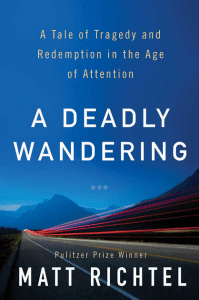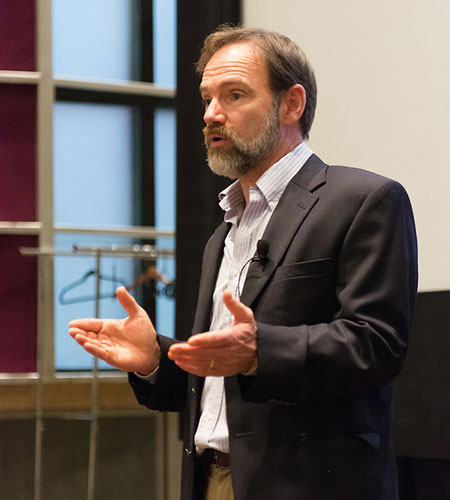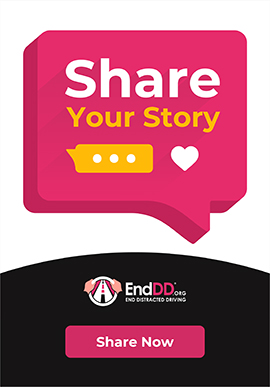 Reggie Shaw was texting while driving in 2006 and killed two men —rocket scientists in Utah with families – wives, children, brothers and sisters. When telling his story Reggie implores people not to text, saying you don’t want to be like me. Matt Richtel’s book , “A Deadly Wandering – A Tale of Tragedy and Redemption in the Age of Attention,” tells Reggie’s story and also the story of those who were affected by Reggie’s decision to text and drive.
Reggie Shaw was texting while driving in 2006 and killed two men —rocket scientists in Utah with families – wives, children, brothers and sisters. When telling his story Reggie implores people not to text, saying you don’t want to be like me. Matt Richtel’s book , “A Deadly Wandering – A Tale of Tragedy and Redemption in the Age of Attention,” tells Reggie’s story and also the story of those who were affected by Reggie’s decision to text and drive.
It is beautifully written and explores the tragedy of distracted driving crashes from both sides – the driver/ killer and those affected by a driver’s choice to take risks while driving. It also explores the science behind distracted driving in terms that we can all understand. Richtel, a writer for the New York Times and a Pulitzer Prize winning author, discusses how our brains work and why we are limited in our ability to multi-task while driving. Richtel also explains why these crashes will continue unless we make individual and societal changes about the importance of being connected. Currently, we often chose connectedness while driving at the expense of human life. Richtel’s book will certainly cause some to change the way they drive. It is very much worth reading on a number of levels.
For me, it is a story of redemption, and forgiveness and the exploration of these concepts will resonate with everyone who reads this book. It is a story of how good can come out of suffering, how one man, initially reviled for what he had done, was able to earn respect, forgiveness and love from others, including those whose loved ones he killed.
When Reggie talks with audiences his suffering, remorse, and at times, self-loathing and self-hatred are evident. There is no question but that he is heartfelt and genuine and his raw emotions come out in a way that is unlike anything most have experienced.

I have met Reggie as a result of the work of my organization, EndDD.org.
I have heard Reggie tell his story publicly, but also have talked privately with him. Last year Reggie and I were on a panel at a teen distracted driving conference. Reggie was to tell his story and I was to tell mine – my daughter Casey was killed by a distracted driver in 2009. I described how the driver who had killed Casey had never reached out, never offered an apology or condolences and how that added to our pain.
Reggie spoke next. While at the podium he turned back to look at me and said he was sorry for Casey’s death and was sorry for all the others killed by distracted drivers. He offered his apology for the man who could not and would not offer his own. He took upon himself the responsibility and burden for what another had done, not just for Casey, but for all whose loved ones had been killed by distracted drivers. It was as deeply sincere an apology as I could ever hope to receive.
Tears can be the product of many emotions — from the anguish and pain of contemplating a future without one’s child and knowing your child’s death was not instant, nor pain-free, but also from being the beneficiary of a gift that soothes and comforts, but which came at great cost from another. When we hugged I cried freely and felt some of my burden lift. I recall thinking in that moment that Casey would have liked Reggie very much.
Reggie and I have talked about how what we are doing now in life is not what we had intended and agree there is a plan and higher purpose for us that we cannot fully understand. And we talked of self-forgiveness, one day granting permission to forgive ourselves – me for living and going on with life when my daughter is dead, and he, for killing two men and causing so much pain to those who loved them. All who know Reggie, or have heard him speak, or who will read this book, will also hope that Reggie can forgive himself.
Stories have the power to change lives and this story will change lives. While no one would want to be “that guy” who killed others, the world would be a better place if there were more of us who had the grace, honesty, morality, purpose, decency and compassion of Reggie. Thank you Reggie for your gift to me and for telling your story yet again, so that many more can hear it.






